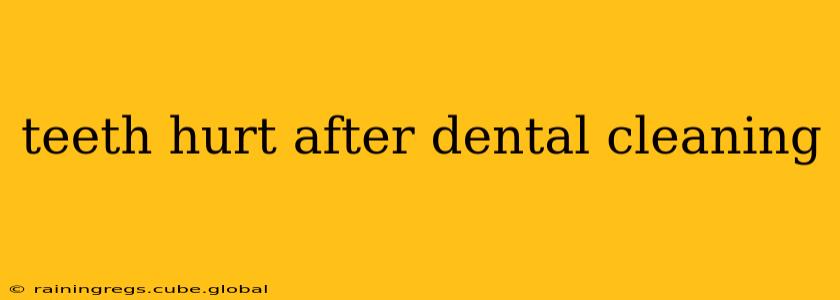A dental cleaning should leave you with a fresh, clean feeling, not pain. However, it's not uncommon to experience some discomfort afterward. This post will explore the reasons why your teeth might hurt after a cleaning and offer solutions to alleviate the pain. We'll also address some frequently asked questions to provide a comprehensive understanding of this common post-cleaning experience.
Why Do My Teeth Hurt After a Dental Cleaning?
Several factors can contribute to tooth sensitivity and pain following a professional cleaning. The most common culprits include:
-
Exposed Dentin: During cleaning, plaque and tartar are removed, sometimes exposing the dentin, the layer beneath the enamel. Dentin contains microscopic tubules that lead directly to the nerves in your teeth, making them highly sensitive to temperature changes, pressure, and sweets.
-
Gum Irritation: Aggressive cleaning or instruments that irritate the gums can cause inflammation and sensitivity. This is more likely if you have gum disease (gingivitis or periodontitis). The cleaning process itself can also cause temporary gum soreness.
-
Deep Cleaning (Scaling and Root Planing): If you underwent a deeper cleaning to address gum disease, the increased manipulation of the gums and roots can lead to more significant and prolonged discomfort.
-
Pre-existing Sensitivity: Some individuals naturally have sensitive teeth, even before a cleaning. This pre-existing sensitivity is often exacerbated by the cleaning process.
-
Dry Mouth: Saliva helps to protect your teeth and neutralize acids. If your mouth is dry after a cleaning (perhaps due to anxiety or medication), it can increase sensitivity.
How Long Does the Pain Last?
The duration of pain varies depending on the individual and the type of cleaning received. Mild discomfort usually subsides within a day or two. However, more intense pain from a deep cleaning may last a few days or even a week. If the pain persists for an extended period or worsens, it's crucial to contact your dentist.
What Can I Do to Relieve the Pain?
Several at-home remedies can help alleviate post-cleaning tooth sensitivity:
-
Over-the-Counter Pain Relievers: Ibuprofen or acetaminophen can help manage pain and inflammation. Always follow the recommended dosage.
-
Desensitizing Toothpaste: These toothpastes contain ingredients like potassium nitrate or strontium chloride that help block the tubules in the dentin, reducing sensitivity. Use them regularly for several weeks to see improvement.
-
Sensitive Mouthwash: Similar to desensitizing toothpaste, certain mouthwashes can help numb the sensitive areas and reduce discomfort.
-
Cold Compresses: Applying a cold compress to your cheek can help reduce inflammation and numb the area.
-
Soft Foods: Avoid hot, cold, acidic, and sugary foods and drinks that can further irritate sensitive teeth. Stick to soft, lukewarm foods for a few days.
-
Good Oral Hygiene: Maintain meticulous oral hygiene by brushing gently with a soft-bristled toothbrush and flossing carefully.
Is it Normal to Have Bleeding Gums After a Cleaning?
A small amount of bleeding is often normal immediately after a dental cleaning, particularly if you have gingivitis. However, excessive or prolonged bleeding should be reported to your dentist.
When Should I Call My Dentist After a Dental Cleaning?
Contact your dentist if:
- The pain is severe or doesn't improve within a few days.
- You experience excessive bleeding from your gums.
- You notice any swelling or infection.
- You have persistent bad breath.
Remember, a dental cleaning is a crucial part of maintaining good oral health. While some discomfort is expected, severe or prolonged pain is not. Contact your dentist promptly if you have any concerns. By following the tips outlined above and keeping a close watch on your symptoms, you can effectively manage any discomfort and maintain a healthy smile.
